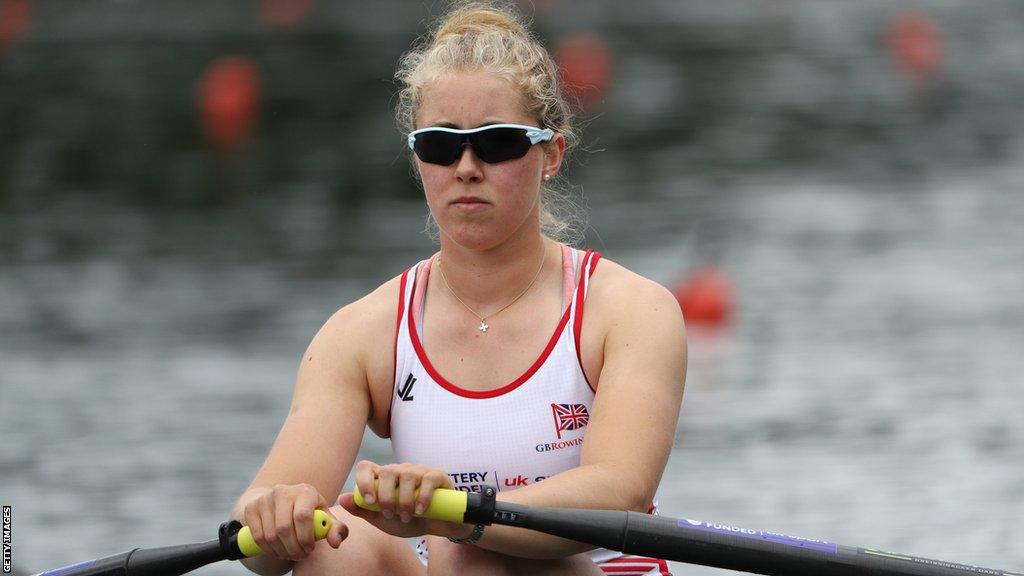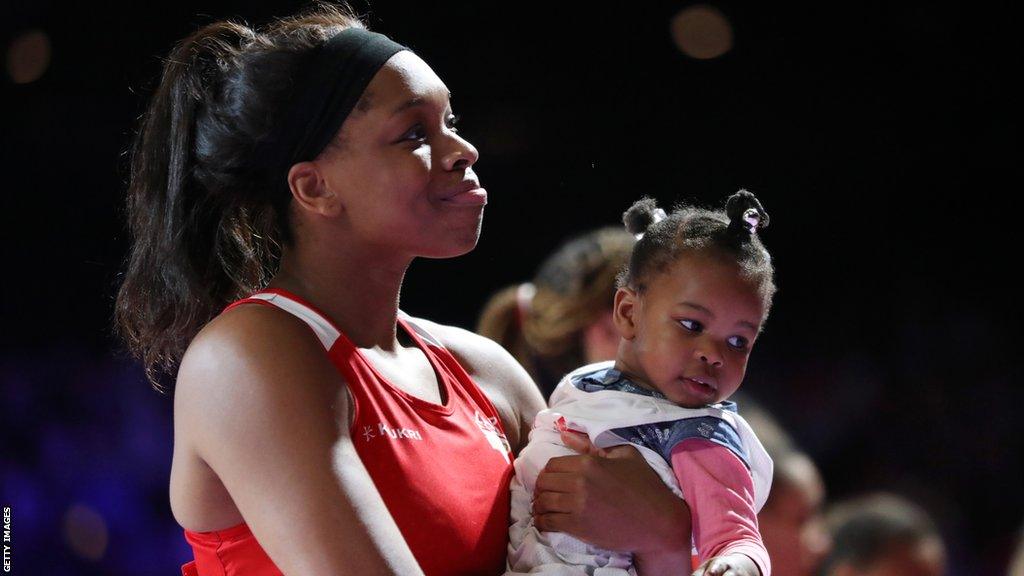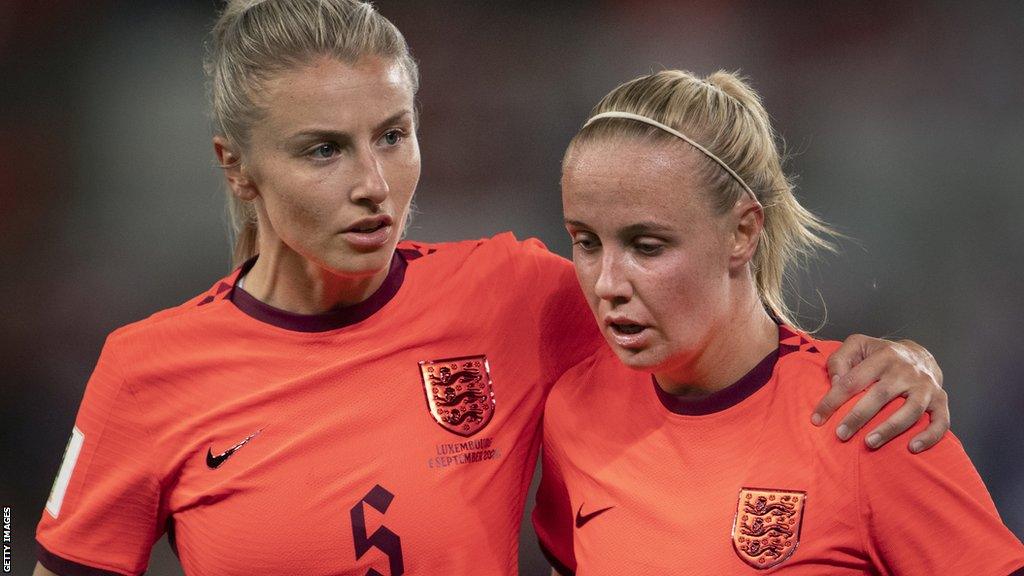Women in sport: GB Olympic rower felt 'alienated' as she tried to return after pregnancy
- Published

Mathilda Hodgkins Byrne competed in the quadruple sculls at the Tokyo Olympics in 2021 as Team GB finished seventh
A Team GB rower has told MPs she feels "pushed to the side" and "alienated" after having a baby and trying to return to elite rowing.
Mathilda Hodgkins Byrne rowed at the Tokyo Olympics and gave birth in 2022.
She told the Women's and Equalities Committee she delayed telling GB Rowing she was pregnant over concerns she would lose funding.
"From the minute I said I was pregnant, and currently, I'm not part of the squad," the 28-year-old said.
"At the moment I'm now being treated as a development athlete, or an athlete who's been injured or ill rather than someone who has had a baby."
Following the hearing, GB Rowing's team director of performance Louise Kingsley said the sporting body was "very disappointed" by Hodgkins Byrne's comments.
GB Rowing had created a "bespoke coaching and training programme based on her needs, availability and fitness", Kingsley added.
Hodgkins Byrne was joined by several current and former athletes to discuss sexism and health inequality in sport.
'You get called soft'
In a BBC survey of elite British sportswomen in 2020, 60% of respondents said their performance had been affected by their period, and they had missed training or competitions because of it.
Despite that, 40% said they did not feel comfortable discussing their period with coaches and a number take the contraceptive pill to control their menstrual cycle.
Former England rugby international Shaunagh Brown, who retired at the end of 2022, said men were generally not interested in hearing about periods.
"We've had sessions as a squad that are about training around your period, about what you can't do and when you're at highest risk of injury, and the male coaches were not in the room," Brown told the committee.
"I questioned it afterwards and there were very poor excuses why they couldn't be there, yet they're at every other single session."
Brown added that periods should be introduced into athletes' education courses: "We have to sit through a drugs and gambling awareness programme every year in rugby - why not do the same around periods?"
Hodgkins Byrne talked to the panel about her diagnosis with relative energy deficiency in sport (Red-S), a condition that occurs when athletes expend more energy in training than they consume through food and drink.
It can affect levels of oestrogen and losing your period can be a warning sign of the condition.
"It's seen as more abnormal if you have a regular period [in rowing]. It's almost at times considered that you're not training hard enough it you still actually maintain having one," Hodgkins Byrne said.
"It's one of those things where you don't want to say you're uncomfortable because you'll get called soft."
Kingsley said GB Rowing had introduced and implemented a number of initiatives in relation to women's health, including an ongoing research project into the relationship between training loads and the impacts of the menstrual cycle.
On rugby, Brown said: "Part of that as well is that you want to be picked, you want to be selected. You don't want to say I can't train today because my tummy's not right."
'I thought you had to retire to have a baby'

Eboni Usoro-Brown gave birth to her daughter in August 2020 and returned to play for the Roses in November 2021
The 2020 survey of elite British sportswomen also found more than 4% of respondents had abortions because they felt a baby would affect their sporting careers, while more than a third delayed starting a family.
Eboni Usoro-Brown, a former England netball player who gave birth to her daughter in August 2020, said there needs to be more education around pregnancy policies offered to athletes.
"I always thought you had to retire in order to start a family," said Usoro-Brown, who brought her career to an end after competing at the Commonwealth Games in Birmingham last summer.
"There weren't very many positive examples for me, especially in my own sport, of people coming back and excelling and being selected for those elite squads.
"The education is needed, informing those younger athletes that with the right programme and funding in place, it can be possible."
Having delayed telling GB Rowing about her pregnancy until UK Sport released official pregnancy guidance in November 2021, Hodgkins Byrne said the policy did not give athletes enough opportunity to recover and return to competing.
She said: "My biggest criticism to the pregnancy document is that it only goes to nine months postpartum, and I know in some sports it is possible to return - cycling they're world champions in seven months - but in rowing I'm not allowed to race this summer and there's no security for me or my funding.
"My support team have been brilliant, but the support team doesn't include the coaches or management… and unless they're on board it's very easy to feel alienated and feel pushed to the side a little bit. Which is my experience with it at the moment."
Kingsley said GB Rowing supported Hodgkins Byrne during her pregnancy by working with the UK Sports Institute to provide one-on-one support across areas such as mental health and physiology.
'We are treated like small men'

Leah Williamson and Beth Mead were among four Arsenal Women players to suffer ACL injuries last season
At this summer's World Cup, England will be without their captain Leah Williamson and Euro 2022 Golden Boot winner Beth Mead because of anterior cruciate ligament (ACL) injuries.
A host of other players sustained ACL injuries in the Women's Super League last season, leading to renewed calls from players, fans and managers for more research into why this type of serious knee injury is more prevalent in female athletes than males.
A British Orthopaedic Association report, external released on Tuesday called the WSL's ACL injury problem "just the tip of the iceberg".
For Brown, the problem lies in female athletes being treated like "small men", while Hodgkins Byrne said: "We don't train at all with women's health in consideration."
"The current mindset is that you train until you break, and breaking and injury is part of the training programme," Hodgkins Byrne added.
"I've been part of the women's squad since 2016 and we do have more fatigue issues, we do have more rib injuries.
"But the consideration between men's and women's teams is the same - everyone trains until they break."
Brown said gender should be considered in a similar way to age and weight categories being used to tailor training programmes.
The former prop's thinking was in line with the British Orthopaedic Association report which said sport needed to strive towards equity rather than equality for female athletes, adding that training regimes and sports equipment needed to be designed with women in mind.